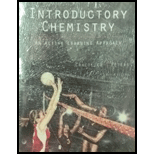
Interpretation:
The molecular formula for
Concept introduction:
The molecular formula is the simplest representation of the compound that tells about the number of each atoms present in the given compound.
In the IUPAC name of an organic compound, the Greek prefix represents the number of the substituent and the numbers before the Greek prefix represent the position of the substituents. The suffix for
Trending nowThis is a popular solution!

Chapter 21 Solutions
Bundle: Introductory Chemistry: An Active Learning Approach, 6th + LMS Integrated for OWLv2, 4 terms (24 months) Printed Access Card
- What is the name of the following compound? SiMe3arrow_forwardK Draw the starting structure that would lead to the major product shown under the provided conditions. Drawing 1. NaNH2 2. PhCH2Br 4 57°F Sunny Q Searcharrow_forward7 Draw the starting alkyl bromide that would produce this alkyne under these conditions. F Drawing 1. NaNH2, A 2. H3O+ £ 4 Temps to rise Tomorrow Q Search H2arrow_forward
